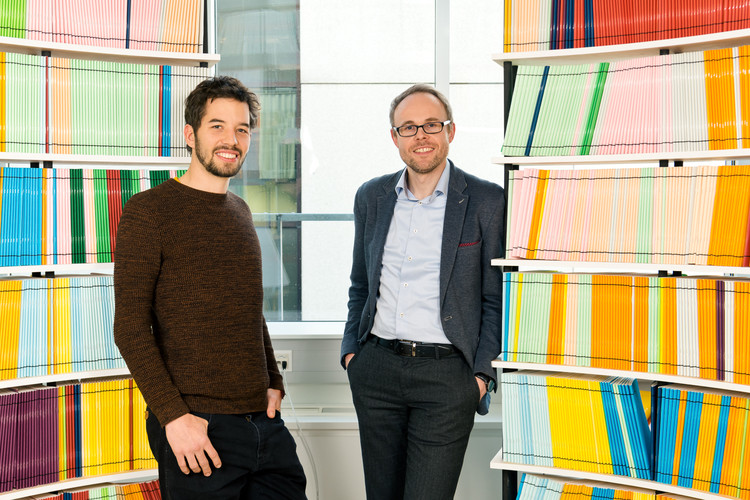News
This page lists major papers and other milestones. For more frequent updates, please check the social media accounts on Twitter (X), Bluesky, and LinkedIn.

Potential and limitations of AI in biomedical research
28/01/26
A research team from the Medical University of Vienna and the CeMM Research Centre for Molecular Medicine has investigated how so-called AI agents could change the future of biomedical research in a recently published study. The results point to enormous potential for acceleration, but this can only be exploited if it is accompanied by reforms in the exchange and review of scientific findings, investment in shared research infrastructure and targeted support for the introduction of new tools. The study was published in Scientific Reports.

Chatting with Your Cells: Natural-Language AI for Single-Cell Data Analysis
11/11/25
Single-cell sequencing provides great insights into the inner workings of cells – but making sense of the data requires advanced bioinformatics skills. Researchers at CeMM, Medical University of Vienna, and St. Anna Children’s Cancer Research Institute have now developed an artificial intelligence (AI) method and software tool that lets scientists explore such datasets through natural-language conversations – speaking English with the computer instead of having to learn a programming language. This study, published in Nature Biotechnology (DOI 10.1038/s41587-025-02857-9), illustrates how modern AI makes biomedical research more accessible and effective.

“Transfer Science to Spin-off” Grant for CAR T Cell Therapy by the Christian Doppler Research Association
06/10/25
Cell and gene therapies are transforming modern medicine, and CAR T cells are among the most promising immunotherapies. Building on an ERC-funded discovery platform, Christoph Bock’s team will further develop CRISPR-enhanced CAR T cells and prepare them for clinical testing in collaboration with the Medical University of Vienna.

Eugenia Pankevich receives the Life Sciences Research Award Austria 2025 in the Category “Social Impact”
25/09/25
The Austrian Association of Molecular Life Sciences (ÖGMBT), supported by the Austrian Federal Ministry, awarded a Life Sciences Research Award Austria 2025 award Eugenia Pankevich for her PhD research in the Bock Lab, which focused on systematic enhancement of CAR T cell function using CRISPR genetic screens.

Boosting the Body’s Cancer Fighters: CRISPR Screens Unlock the Potential of CAR T Cells
24/09/25
CAR T cells have revolutionized the treatment of certain blood cancers, but they often fail. A new study published in Nature (DOI: 10.1038/s41586-025-09507-9) by scientists at CeMM and the Medical University of Vienna introduces a novel CRISPR screening platform, which discovered unexpected genetic edits that make CAR T cells more effective as cancer therapies.

How Immune Cells Switch into Attack Mode – New Insights into Macrophage Biology
08/08/25
Fighting off pathogens is a tour de force that must happen with speed and precision. A team of researchers at CeMM and MedUni Vienna led by Christoph Bock and Matthias Farlik has investigated how macrophages—immune cells that are the body’s first responders—master this challenge. Their study, published in Cell Systems (DOI: 10.1016/j.cels.2025.101346), offers a time-resolved analysis of the molecular processes that unfold when these cells encounter various pathogens. They developed a new method that combines gene editing and machine learning, which identified key regulators of macrophage immune responses.

Christoph Bock elected as EMBO Member
01/07/25
With this prestigious recognition, EMBO honors Christoph Bock for his scientific contributions at the interface of biotechnology, bioinformatics, and molecular medicine. His research combines experimental immunology and cancer biology with computational methods, including machine learning and artificial intelligence. “We develop technologies to help understand human diseases in all their complexity, and we aim to program immune cells as molecular therapies,” Christoph Bock says, describing the main focus of his work.

"ChatGPT" for biomedical simulations: Study shows potential of large language models for research
11/07/24
The artificial intelligence (AI) model GPT-4, known from its application in ChatGPT, shows impressive capabilities in biomedical research and can be used in many ways for simulations. A simulator developed at MedUni Vienna and CeMM and based on GPT-4 shows increased accuracy in classifying the importance of genes in cancer cells, as well as in the prognosis of cancer patients. The results of the study were published in the journal Computers in Biology and Medicine.

JAK-STAT signaling maintains homeostasis in T cells and macrophages
24/04/24
When pathogens invade the body, the immune system must react immediately to prevent or contain an infection. But how do our defence cells stay ready when no attacker is in sight? Scientists from Vienna have found a surprising explanation: They are constantly stimulated by healthy tissue. This keeps them active and ready to respond to pathogens. Based on this insight, future medications could be devised to selectively enhance our immune system’s attention. The study has been published in the journal Nature Immunology.
